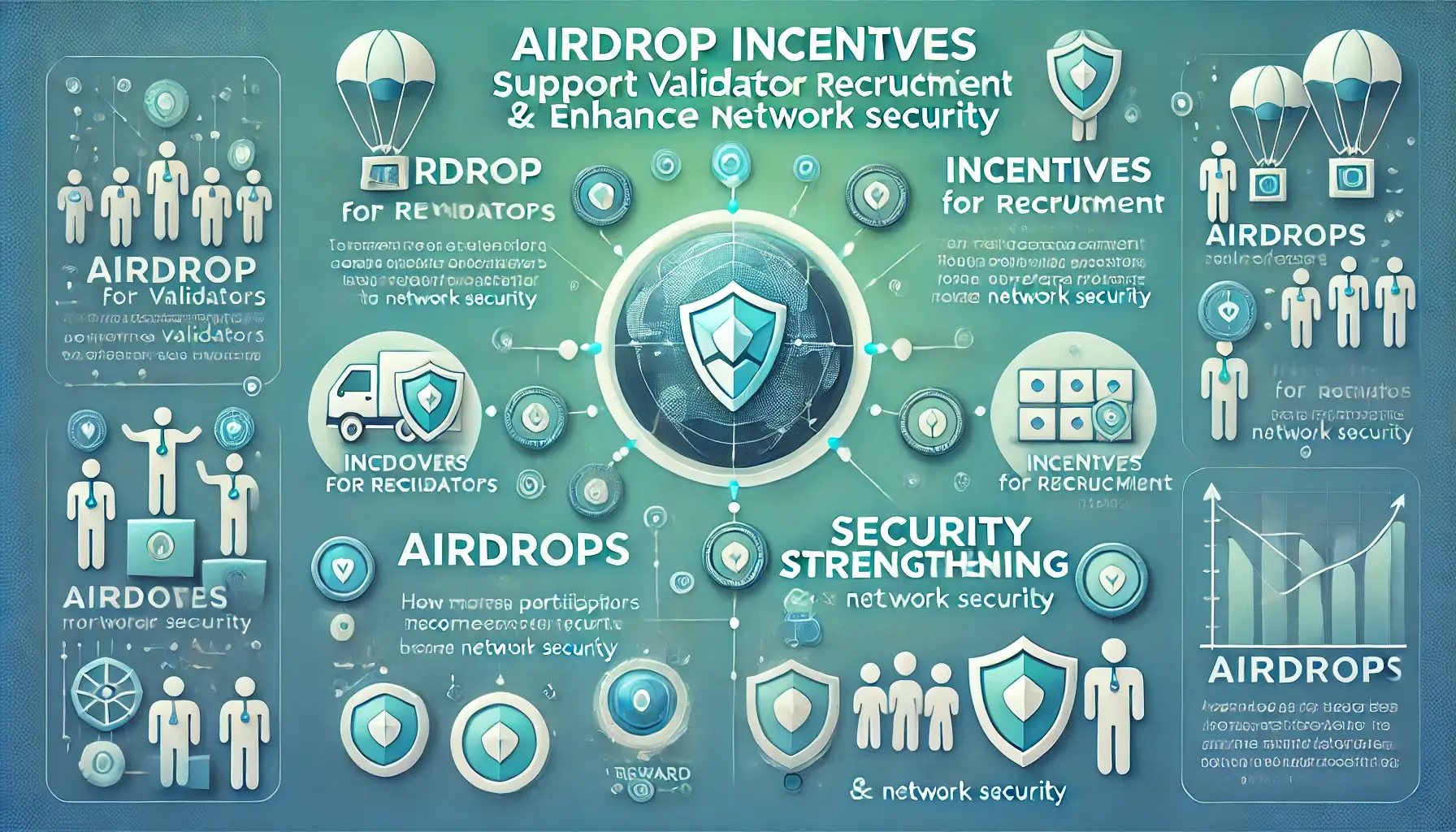Airdrops are now an essential tool in the cryptocurrency industry, serving as incentives not just for regular users but also for critical participants like validators. With a focus on airdrops for validator participation and incentivizing validators with airdrops, blockchain projects are attracting these essential players to their networks. Validators play a vital role by securing the network and verifying transactions. By providing airdrops to incentivize validators, projects reduce the financial barriers, making it easier for validators to join and strengthen decentralized networks.
1. The Role of Validators in Blockchain Networks
Validators are key to the security and functionality of decentralized blockchain networks that operate on Proof of Stake (PoS) or Delegated Proof of Stake (DPoS) models. Their responsibilities include:
- Validating Transactions: Validators check transactions to ensure they are legitimate before adding them to the blockchain.
- Network Security: By staking tokens and dedicating resources, validators defend the network from attacks.
- Decentralization: A network of distributed validators prevents central control, upholding the blockchain’s decentralized nature.
However, attracting enough validators is often challenging for new projects. That’s why airdrops for validator participation are becoming increasingly important. Incentivizing validators with airdrops gives projects a way to quickly build a secure and decentralized validator base.
2. How Airdrops Help in Incentivizing Validators
Airdrops serve as an effective way to incentivize validators with airdrops. Here’s how airdrop campaigns attract and engage validators:
2.1 Reducing the Cost Barrier
Becoming a validator usually requires staking a substantial amount of tokens, which can be a financial hurdle. By offering airdrops, projects lower the entry cost, making it feasible for more validators to join the network.
For instance, if a blockchain requires 1,000 tokens to become a validator, an airdrop of 500 tokens immediately cuts the required investment in half. This strategy of incentivizing validators with airdrops makes it easier for participants to meet the staking requirement.
2.2 Providing Early Rewards for Network Security
Early validators often face more risks when supporting a new network. Airdrops act as initial rewards for these validators, compensating them for their support at a crucial phase.
For example, networks like Cosmos and Polkadot have implemented airdrops to incentivize validators, providing them with early rewards and encouraging them to join early in the network’s life cycle. This builds initial security and stability for the project.
3. Building Long-Term Engagement Through Airdrops
While airdrops can attract validators, they also serve to encourage long-term validator participation through strategic approaches:
3.1 Lock-up Periods and Vesting Schedules
Many projects use vesting schedules or lock-up periods on airdropped tokens. This ensures validators remain committed over time, as they cannot immediately sell their tokens.
For example, validators may receive airdropped tokens with a vesting period of six months. This gradual unlocking of tokens promotes sustained participation and long-term validator engagement.
3.2 Governance Rights with Airdropped Tokens
Some projects use airdrops to distribute governance tokens to validators. This allows validators to participate in important project decisions, fostering a deeper sense of ownership and commitment.
For instance, networks like Arbitrum provide governance tokens through airdrops, allowing validators to vote on upgrades, reward distribution, and other key decisions. This form of incentivizing validators with airdrops gives them a stake in the project’s future.

4. Successful Examples of Airdrops for Validator Engagement
Several blockchain projects have successfully incentivized validators with airdrops. Here are two notable examples:
4.1 Cosmos Hub’s ATOM Airdrop
Cosmos, a PoS blockchain, airdropped ATOM tokens to early adopters and potential validators. This move incentivized many individuals to become validators, securing the network and fostering a decentralized community.
4.2 Mina Protocol’s Validator Airdrop
Mina Protocol, known for its lightweight blockchain design, conducted airdrops to specifically attract validators. By distributing MINA tokens, the project successfully incentivized validators with airdrops, creating a robust and secure network.
5. Benefits of Airdrops for Validators and Blockchain Projects
Airdrops designed for validator incentives benefit both validators and blockchain projects in various ways:
5.1 Benefits for Validators
- Lower Cost of Entry: Validators receive free tokens to help meet staking requirements.
- Early Rewards and Compensation: Airdropped tokens provide initial rewards, compensating validators for their contributions.
- Influence in Governance: Governance tokens give validators a voice in the project’s direction.
5.2 Advantages for Blockchain Networks
- Stronger Security: More validators enhance the network’s security against attacks.
- Decentralization: A large validator base prevents centralization, ensuring network integrity.
- Engaged Community: Airdrops create a validator community committed to the project’s success.
6. Future Trends in Airdrops for Validator Recruitment
As competition for validators intensifies, projects are refining their airdrop strategies. Here are some emerging trends:
- Targeted Airdrops for Skilled Validators: More projects may focus on experienced validators, offering them larger airdrops.
- Cross-Chain Airdrops: With increased interoperability, validators could receive airdrops from multiple networks.
- Specialized Airdrops for Advanced Validators: Some projects may offer airdrops specifically for validators with unique skills, such as zk-rollup expertise.
Conclusion
Airdrops for validator participation and incentivizing validators with airdrops are reshaping the way blockchain networks attract and retain these crucial participants. By offering initial incentives and fostering long-term commitment, airdrops help build secure, decentralized, and community-driven ecosystems. As blockchain technology evolves, airdrop strategies will continue to play a central role in supporting validator recruitment and driving sustainable growth.
For more insights and guides on blockchain applications and validator incentives, visit our Blockchain Technology Guides.
Stay Updated
For the latest updates on validator incentives, blockchain technology, and crypto trends, follow us on:
Stay informed with the latest strategies and insights in the world of cryptocurrency at FreeCoins24.io.
Special Offer
Looking to explore more in the crypto world? Sign up on Bybit today and take advantage of up to $30,000 in deposit bonuses. Don’t miss out on the chance to trade secure and promising cryptocurrencies on a leading exchange.
















